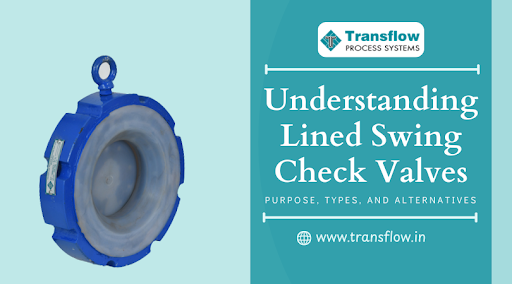18
August
August
Understanding Lined Swing Check Valves: Purpose, Types, and Alternatives

When working with aggressive or corrosive fluids, choosing the
right check valve is critical. One of the most commonly used types in such
applications is the Lined Swing Check Valve. But what exactly is its purpose,
and how does it differ from other check valves?
Let’s explore the frequently asked questions to understand this
essential valve better.
What is the Purpose of a Swing Check Valve?
A swing check valve allows fluid to flow in only one direction and automatically
prevents backflow. It operates using a hinged disc that swings open when fluid
flows forward and closes when the flow reverses.
What’s the Difference Between a Swing Check Valve and a Spring Check Valve?
Here are the key differences between a swing check valve and a spring (inline)
check valve:
- Swing Check Valve: Uses a hinged disc that swings open with forward flow and closes with reverse flow.
- Swing Check Valve: Ideal for horizontal pipelines.
- Swing Check Valve: Closes slowly, which may result in water hammer (pressure surge).
- Swing Check Valve: Simple design with fewer components, easy to maintain.
Mechanism
Flow Orientation
Closing Speed
Maintenance
What is Another Name for a Swing Check Valve?
Swing check valves are also known as:
- Wafer check valve
- Non-return valves (NRVs)
These names are often used interchangeably depending on industry
and region.
Why Choose a Lined Swing Check Valve from Transflow?
At Transflow, our Lined Swing Check Valves are specially designed to handle
corrosive and abrasive media. The valve body is internally lined with PTFE or
other corrosion-resistant materials, ensuring long life and chemical
compatibility in demanding environments like:
- Chemical processing
- Pharmaceuticals
- Water treatment
- Food and beverage
Benefits of Transflow Lined Swing Check Valves:
- Excellent resistance to corrosive chemicals
- Smooth operation with minimal pressure drop
- Easy maintenance and installation
- Cost-effective for long-term use
Conclusion:
Whether you’re comparing swing check valves vs. inline check valves or trying to
understand their purpose, choosing the right type for your application is
crucial. For industries dealing with harsh chemicals, lined swing check valves
offer unmatched protection and performance.

